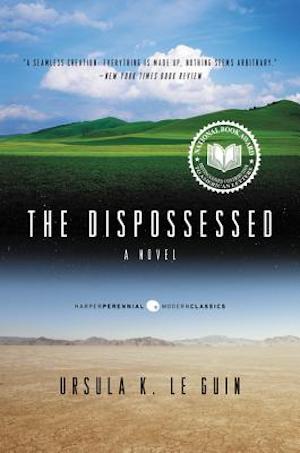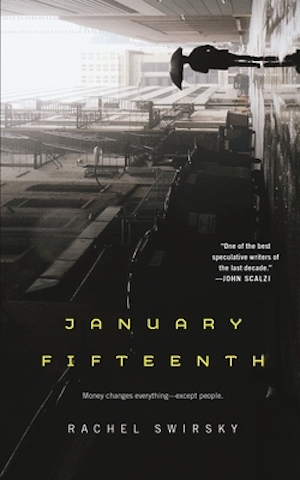To quote noted English philosophers Andrew Lloyd Webber and Tim Rice, “(there) will be poor always, pathetically struggling.” History seems to support this thesis. Indeed, the poor serve essential roles: Without poor people, to whom would the rich feel superior? Whose bodies would be used to test the sharpness of one’s new sword? Who would volunteer to be hunted in the spring revels so that their families might be fed for another week? It seems impossible for many people to imagine society without poverty and privation.
Still, science fiction often embraces the impossible. A genre that sees nothing wrong with discarding General and Special Relativity could well craft stories envisioning a perfect Gini coefficient of zero (or as close as it’s possible to get). In fact, it has: Consider these five settings.
Anarres (from The Dispossessed by Ursula Le Guin)

Urras’ great powers A-Io and Thu agree on very little, but they have agreed on the undesirability of tolerating rabble-rousing anarcho-syndicalists. Happily, a solution presented itself: allow the political deviants to settle Urras’ barely habitable moon, Anarres. The anarchists could do whatever they pleased out of sight of decent folk, allowing A-Io and Thu to focus on great-power rivalries.
Outsiders might deem Anarres a mixed success.1 While it’s true that there are no extremes of comparative wealth or poverty on Anarres—meaning that everyone enjoys the same level of prosperity—that level is low. Anarres is a poor, harsh world and the struggle for survival leaves meager surpluses. Arguably, this is the price of independence, however: had Anarres been as rich as Urras, the home world might not have been as willing to relegate it to anarchists.
Four-BAA, Four-BEE, and Four-BOO (from the Biting the Sun duology by Tanith Lee)

The three domed cities on a nameless desert planet that is almost certainly not the Earth of the distant future2 provide their human inhabitants with an abundance of luxury and indulgence. Young people known as “Jang” enjoy promiscuous frolics, outrageous self-indulgence, and bodies made to order. Older Persons are free to embrace more sedate pastimes suitable to their station.
The catch, as the nameless protagonist discovers, is that only physical needs will be met. Persons craving meaningful activity will soon learn that while the cities are run for the humans, they are run by the quasi-robots. The quasi-robots have firm limits to their tolerance of their charges’ eccentricities. Should someone begin questing for something beyond empty decadence, that someone will discover that even the undying Jang can be deposited in a silent desert grave by their disapproving minders.3
Beta (from the Vorkosigan Saga by Lois McMaster Bujold)

The second interstellar colony, Beta, may have seemed an unpromising world. It was a harsh desert planet4 rather than a verdant garden. The Betans rose to the challenge of living on their adopted world. Whereas colonies on greener worlds developed into imperialist autocracies, feudalist realms, and predatory capitalisms, Beta is a comfortable, diverse, self-satisfied middle-class democracy.
Not that Beta Colony is paradise. The powers-that-be have a habit of subjecting resistant humans to corrective therapy, informed consent not required (though of course after therapy the hapless subjects will agree that it was all for the best). Nevertheless, compared to the other worlds in this setting, Beta is a great place to live. That may be why Bujold sets most of her stories on other, more plot-friendly worlds.
The Culture (from the Culture series by Iain M. Banks)

The Culture’s prodigious technology allows its citizens to live on both planets and orbital habitats, as well as in vast spaceships. These human environments are crafted and controlled by godlike AIs, the Minds. The Minds have created a post-scarcity society whose humanoid members may enjoy freedom with or without responsibility, as well as lifestyles lavish beyond the dreams of beings constrained by technological limitations.
Outsiders, no doubt a curmudgeonly, cynical lot, might point out that the Minds run the Culture, while the humanoids occupy a position not unlike pampered housecats. Perhaps. The Minds appear to be more benevolently inclined towards their charges than Tanith Lee’s quasi-robots. For the few Culture humanoids who find paradise boring, there is always the option of joining the Secret Service-style division known as Special Circumstances.
The United States of America (from January Fifteenth by Rachel Swirsky)

Crisis forced a great change to the American way of life. Universal basic income became law. Every January 15th, each American, regardless of class, creed, or colour, receives their annual Universal Basic Income check. Each citizen is thus assured that there is a level beneath which they cannot fall, that life’s basic necessities will be assured.
This US is not notably paradisiacal. As the novel reveals, there are those for whom the income is an insignificant, unearned extra to be squandered. For others, it means old abuses and frauds take new forms. Still others discover that their most pressing challenges are ones which the UBI cannot address. Nevertheless, the net effect seems to be a gain.5
***
These are, of course, only five SF settings out of the thousands authors have imagined. No doubt there are many others to which I could have turned, ones some readers believe are superior. Comments are, as ever, below.
In the words of fanfiction author Musty181, prolific book reviewer and perennial Darwin Award nominee James Davis Nicoll “looks like a default mii with glasses.” His work has appeared in Publishers Weekly and Romantic Times as well as on his own websites, James Nicoll Reviews (where he is assisted by editor Karen Lofstrom and web person Adrienne L. Travis) and the 2021 and 2022 Aurora Award finalist Young People Read Old SFF (where he is assisted by web person Adrienne L. Travis). He is a four-time finalist for the Best Fan Writer Hugo Award, and is surprisingly flammable.
[1]Le Guin was not blind to possible flaws in her imaginary society: the novel is subtitled “An Ambiguous Utopia.”
[2]Although if one wanted to imagine that the Lee books are prequels to Arthur C. Clarke’s “The City and the Stars,” there’s surprisingly little evidence to rule that out.
[3]One is reminded of certain stories by Poul Anderson and Philip Jose Farmer, in which mass automation leads to mass unemployment and mass welfare.
[4]Another desert world. How odd. I will assume this is some sort of small set statistical weirdness, not a correlation between harsh environments and egalitarianism.
[5]There must have been employers whose business models imploded when workers became less desperate, but the novella doesn’t focus on them.











How about Panga, from Becky Chambers’ very enjoyable Monk & Robot novellas?
That’s a good choice!
The people of Annares might say that while the people of Urras would benefit from anarcho-syndicalism, their desert world makes it not only beneficial but necessary.
Farmer’s Riverworld – although paradise breaks down with surprising speed as greed and ambition take over.
Rather ironically (since Asher and Banks are pretty much at opposite ends of the UK political spectrum) Neal Asher’s “Polity” setting is very hard to tell apart from Iain Banks’s Culture.
The Galactic Milieu in Julian May’s series may have its problems, but it’s clear that individual poverty isn’t among them.
Cordwainer Smith’s Instrumentality of Mankind, at some stages of its development, might look reasonably like a post-scarcity utopia, at least in a dim light.
And of course Star Trek’s Federation is at least trending in the direction of a post-scarcity economy,
This Perfect Day, an oldie but very goodie by Ira Levin, also comes to mind here.
Steve Wright @5: Troi tells Mark Twain outright that “poverty was eliminated on Earth a long time ago”. (And he believes her unsupported assertions about their completely-integrated post-scarcity society, even though it flies in the face of his own knowledge of people’s behaviour on Earth.) But Picard’s first visit to a Bajoran camp shows clearly that the Federation isn’t particularly effective at helping desperately poor people, even those who are Federation allies, without a swift kick in the pants to someone who has a conscience.
As you alluded to, P. J. Farmer’s “Riders of the Purple Wage” qualifies. America has implemented the ORE – Obverse-Reverse Economy — including basic income for all.
7: Canonicity is debatable but in Last Unicorn Games’ 1990s Deep Space Nine RPG, there was the very interesting detail that colony world replicators were under the control of planetary governors, not individuals. Of course, Federation officials are above reproach (please do not mention all the episodes whose plot was ‘a Federation official or Star Fleet officer goes a bit funny.’),
John Barnes ‘Thousand Cultures are post-scarcity, with instantaneous travel between planets to boot.
I know you bring up Clarke in the footnotes but Childhood’s End might also qualify after the Overlords took control of Earth.
Asimov’s Galactic Empire (before its Fall) doesn’t seem to have much in the way of poverty — nor, come to think of it, does the Foundation itself.
Leckie’s Imperial Radch don’t seem to have much in the way of poverty either.
I was going to suggest that SF Empires in general don’t seem to allow people to be poor; but then I thought of Dune, where the Fremen are (literally) dirt poor.
I think a general rule (which Swirsky’s USA may defy) is that for SF to posit a poverty-free environment, you have to go far from Earth, far from the present, or both.
Most communist-era SF used to be without poverty, except the one that was showing the unequal Western world.
Quite a lot of moderns Fantasy also seem to show societies without poverty.
In my view, overall, poverty is not addressed enough in modern speculative fiction.
Le Guin eliminates poverty in 20,000 AD California in Always Coming Home by redefining it. In the Valley of the Na, “poverty” means “doesn’t give anything to anybody.” “Riches” are, by definition, given away. In addition, private ownership of more than personal items (clothes, a knife, a box of found treasures) is seen as unhealthy–so if you are given much, you are expected to pass it on to other individuals or add it to the common store. On the other hand, you must never say that you have too much, because thinking of any good as undeserved or excessive is disruptive to the fabric of life. You say thank you and then you pass it on.
James Davis Nicoll @9:
A lot of things by Clarke qualify. In addition to Childhood’s End, perhaps the best example is Imperial Earth.
I need help identifying the story, but there’s a Golden Age short story where the ‘poor’ are REQUIRED to consume products, and the richer you are the less you are required to have….
vbob@17: That’s “The Midas Plague” by Frederik Pohl.
0:
I think you’re being a little unfair to Beta. When they have a woman who publicly assaulted the President, and whom they suspect is withholding military secrets (because she is withholding military secrets), the doctor makes extensive efforts to obtain consent from the patient and from a relative before (clearly illegally) trying to treat without consent (so consent is clearly the norm). Meanwhile, an active free press is openly looking for dirt on the President, and no one shows any concern about telling anyone they met that they don’t support him.
Mayhew implies that treatment is non-consensual, but he’s drunk out of his gourd.
The other relevant example is Baz – an enemy soldier illegally living on Beta, and destroying public property – no one makes any effort to get him into therapy. Instead, they offer him food and shelter, but when he refuses (for weeks or months at a time), they just ask the next fellow from his homeworld that they meet to try to persuade him to make a different choice.
Beta does have problems (manipulative lovers are apparently universal) but involuntary treatment is clearly against the rules and only even attempted under extraordinary circumstances (Mayhew is, after all, threatening to blow up a spaceship, while in port).
Heinlein’s Beyond This Horizon and For Us, the Living are poverty free, by the way.
@19: However, Cordelia is certain that if she goes back to Beta and tells them she’s fallen in love with a Barrayaran she will be … deprogrammed. (3 decades later it’s clear that she has visited Beta occasionally, but not how long it took after she meet Aral before she considered it safe.) ISTM unlikely that she’s paranoid; possibly Betan ship captains are considered more worth ~retrieving, or possibly Beta became more careful about messing with people’s minds after Cordelia took the planet upside the head with its own prejudices.
For many of the citations, it’s not clear whether the society is post-scarcity or the author has just not bothered to show us that aspect. ISTR for instance that we see no poor people on Cyteen (and Cherryh has been quite willing to show us people in desperate circumstances in other books), but they may have been left out as unimportant to a plot about planetary power politics. However, @20 is correct that Beyond This Horizon is explicitly post-poverty, however unbelievable the economics are; chapter 1 is titled something like “Everyone Should Have Been Very Happy”. (The plot driver is that some people aren’t happy unless they can feel superior to other people.)
I was gonna mention Imperial Earth! Not sure about the Deep Range.
Cordelia’s problem is that she’s behaving erratically (largely due to stress from the *Escobarran* therapists), and she is genuinely concealing secrets (not that Aral asked her to) out of concern for him and Barrayar. She’s afraid that if she just tells the truth, things will Blow Up. And if she doesn’t tell the truth, they’ll think she’s been literally brainwashed (which is possible to at least some degree, see Bothari, or Beta’s own therapies for the violent) and will try to fix her.
Cordelia has no problem recommending Betan therapy for one of her sons, so she seems to have accepted her situation as unusually fraught, not indicative of deep systemic flaws.
As for Betan poverty, that’s touched on in Barrayar: she has trouble imagining people not having access to a comconsole, let alone food, shelter, and a helpful jobs bureau. (Beta is also very *safe* from violence, one of poverty’s frequent ellow travelers.)
At the other political end, I don’t think L. Neil Smith’s Confederacy is supposed to have poverty, thanks to vigorous libertarianism or something. For Ken MacLeod, we have the Solar Union of _The Cassini Division_ (Culture-lite) and maybe the libertarian society of _The Stone Canal_.
News from Nowhere by William Morris. Everyone works, but they like their jobs & can change when they get bored. This probably affected Narnia.
News from Nowhere by William Morris can be regarded as socialist or anarchist. Everyone works, but they like their jobs & can change if bored. Physical labour gets the admiration sport does in our society, I think this influenced Narnia.
@21: Cordelia’s subsequent visits to Beta Colony would have been as the wife of a foreign Head of State and, depending on the timing, with at least Drou or her replacement as bodyguard along for the trip. Said State has a reputation for taking violent military exception to slights, and has experience in dealing with enclosed cities.
Lots of Socialist utopias eliminate poverty, it seems to go with the territory. An example (which I think I’ve mentioned before) is Summer in 3000 by William Martin (1946), where the utopians live in underground cities and all of their needs are met by the products of voluntary work and carefully designed machinery and organisms – e.g. nobody has to work hard keeping the place clean because they have tailored nocturnal insects that are designed to eat everyday grunge and at an appropriate point in their life cycle move to places where they can die and rot into useful fertiliser. They don’t actually have money or the concept of wealth, except for knowing about it from historical documents and occasional refugees from the dystopian USA.
H G Wells’s The Shape of Things To Come ends with a Socialist utopia where (as I recall) no-one’s considered poor because no-one has any need or desire for more personal property than perhaps a trinket or two of sentimental value.
You might remember the Sci-Fi classic “Venus Equilateral”, by George O Smith, involving a Space Station dedicated to scientific research. Somewhere along the line, our heroes invent a functioning matter duplicator and the rest of the book is taken up by the question of how to maintain a functioning economy in a situation where anyone with a duplicator can produce any material object they desire.
There was also a short story, “Business As Usual, During Alterations”, by Mark Clifton, dealing with the same question.
The phrase “An embarrassment of riches” comes to mind.
For two other stories where automation leads to mass unemployment and mass welfare, see Kurt Vonnegut’s two stories, “Welcome to the Monkey House” and “Tomorrow and Tomorrow.”
The community of Morrow in HM Hoover’s “Children of Morrow” has no poverty in it, and is fairly stealthy even by 20th century standards. However, as the (they think) sole surviving human community on Earth after the death of oceans, it’s uncertain how well that would scans up.
Though pre-industrial, the Kindar society in Zilpha Keatley Snyder’s Below the Root has no poverty, and in fact the general population has no idea even of the concepts of mass hunger, prisons, or an oppressed population. It’s strange that there’s an elite group dedicated to remembering those concepts…
I actually think there is a correlation between harsh environments and the elimination of extreme poverty. In an environment where you need significant technological capability simply to survive (space stations or cities enclosed away from harsh environments like deserts or polar regions), that base technology level prevents the worst of extreme poverty. The basic environment of the space station or environmental habitat would need to be maintained as essentially a public utility, which takes care of the possibility of no shelter. And in an environment where there’s basically no unmonitored space, it becomes really hard to ignore homeless people. I’m not saying the lives of people made homeless would exactly be pleasant (for example, there’s a scene in one of Bujold’s books where a group of unemployed people on a space station are basically press-ganged into indentured servitude), but it would be impossible to freeze or bake and you’d be unlikely to outright starve.
An early (1888) Socialist Utopia, “Looking Backward” by Edward Bellamy.
Cordelia is not only concealing military secrets, she’s showing every sign of being infatuated with a famous war criminal. *Not* trying to treat someone who looks to have suffered some sort of horrific abuse at the hands of one of the worst actors in a famously brutal regime would feel like neglect even if there weren’t a military angle.
The line for involuntary treatment is always going to be fraught. But between “the Barrayarans did something to Captain Naismith that includes forcing her to refuse attempts to fix it” and “the Butcher of Komarr, architect of the Solstice Massacre, is really nice but misunderstood and also kind of dreamy”, I find it hard to blame the Betans for going with the first hypothesis.
Um-Helat in “The Ones Who Stay and Fight” (in How Long ‘Til Black Future Month, by N.K. Jemisin) is lovely.
I read Biting the Sun nearly 25 years ago, and I still remember all of it. Tanith Lee is always spectacular, but this is probably my favorite of hers
Martha Wells’s Murderbot Diaries show contrasting extremes. In the Corporation Rim, the vast majority of the populace lives in debt slavery. Then there’s a wide spectrum of independent systems and somewhere at the far end, there’s the Preservation Alliance, which was founded on a promise that everyone there would always have free access to food, shelter, medical care, and other necessities in perpetuity, and seems to be holding up that promise pretty well, much to the confusion of the occasional citizens of the Corporation Rim who happen to end up there.
Maybe I’m just dense in not getting the joke, but that quote wasn’t original to Andrew Lloyd Webber and Tim Rice. I went and looked it up: it’s in 3 of the 4 gospels, which is a pretty high ratio (Matthew 26:11, Mark 14:7, and John 12:8). The odd one out is Luke, the social justice gospel, which is interesting in the context of who’s imagining worlds without poverty.
@28: Ralph Williams, actually; see https://isfdb.org/cgi-bin/title.cgi?55690+1. He’s even more obscure than Mark Clifton; I’m not sure I’ve ever read anything else by him. But the story is definitely an interesting take on the result of plenty.
@37: That suggests Beta is not exactly the portrayed paradise; it should have better propaganda filters, and better knowledge of what Barrayar can actually do. (“Brainwashing” was a popular claim in the 1950’s; ISTR it has been largely debunked.) I suppose being good to its own citizens isn’t correlated to understanding the outside world.
Huh. I thought I’d read the Williams but if I did the anthology isn’t listed at isfdb.
I think Beta also just has a degree of continuity drift through the series, not unrelated to the degree to which the stories are set there.
When it’s one of the main locations, it’s a more complex place. And of course it’s part of the point of that first story for Cordelia to question some of her own prejudices and assumptions including her home. Later, it’s basically somewhere characters disappear off to for holiday, gap year / university, trauma recovery or transformative medical treatment, and then it’s more straightforwardly great.
Ah, so Beta is basically Canada.
Also, Women on the Edge of Time
@38 chip: is your @37 directed at my #22?
The novel is set like 1000 year in the future, with much better understanding of brain chemistry posited. Kinds of brainwashing are real in the novel; hell, Beta’s own Mental Health Board depends on it.
And the Nexus is a less transparent place than modern Earth. Information propagates via ships jumping through wormholes, and Ezar’s Barrayar has the press freedom of the USSR.
@28 the universal duplicator. Someone else wrote a story about that back in the 60s or so (?Delany ? Zelazny ?Ellison) – the punch line was ennui, where young people had an experience, and then used the duplicator on themselves – the material came from their “old” bodies which was used to create them anew. An interesting comment on what makes a person.
The most interesting society I remember where poverty was “Wasted on the Young” by John Brunner, where society has become so rich that everyone gets a basic income, and up to 30 you can spend on anything you like over that basic, accumulating a debt that eventually you’ll pay back when you become a productive member of society. The story revolves around a young guy who thinks he’s found a way to game the system. Spends on everything he can, mounting up several centuries’ worth of debt. I will not reveal the kicker, you need to read the ending yourself.
@31: In Frederik Pohl’s “Gateway”, I think if you don’t pay rent then there’s an airlock, or does it get that bad?
There are those criminal space bases in various stories… I expect no one pays rent, but everyone pays protection, it’s the same thing. And if not, then the airlock.
@37: Yeah, they adapted it from some book, I don’t know if that’s common knowledge. :-)
Hogan’s Voyage From Yesteryear features a successful post-scarcity society where status comes from deep expertise. It doesn’t matter what subject, just that one has persued it deeply.
Asimov’s The Naked Sun appears to be post-scarcity, though of course it has other problems.
Beta Colony was always an interesting example. On the one hand, they enjoy great freedom of expression in identity and opinions (the recurring “I didn’t vote for Steady Freddy” joke made me both laugh and wonder who actually did vote for him). On the other hand, Cordelia notes that living on an inhospitable world with limited resources means everyone needs to follow some very strict rules, for example, state-regulated reproduction limits. (Just try imagining getting Americans on board with that, even if it was necessary for survival.) Cordelia’s description of the Betan rights, access to information and education, etc. sounds utopic, but then there’s the whole after-the-fact consent thing.
Which really is a sticky conundrum. On the one hand, the truth is pretty implausible. We the readers accept it because we were there, but otherwise, it would probably seem a lot more likely that she’d been brainwashed. Except that the therapist is really condescending about it, because oh, of course there’s no way a middle-aged woman could have had an adventure and found love. Not saying she deserved to be water-boarded in a fish tank, but if someone had been trying to drug me into spilling my guts and treating me like I was too old to have any life, I’d be real tempted.
@48: I think one reason why Cordelia was so desperate to escape was not that she feared a highly effective futuristic brainwashing, but rather that the truth was so implausible that she could see herself being easily convinced it was all a lie simply by a series of extended conversations.
Greg Egan’s Amalgam universe seems to have conquered both poverty and mortality.
The Synarche in Elizabeth Bear’s brilliant “Ancestral Night” is a post scarcity (AI run) society. There’s a conversation between two characters – one from the Synarche and one from a more corporate minded society who asks the Synarche protagonist how to they incentivize hard work without poverty as the penalty, and the answer is why would you, because the value of work is in its outcomes not work itself.
Ada Palmer’s Terra Ignota series doesn’t seem to have any poverty. Its lowest class seems to be labourers who are criminals in the process of being rehabilitated.
The Exodan Fleet in Becky Chambers “Record of a Spaceborn Few” provides necessities for its members. Not precisely utopian, because things are breaking down and everyone needs to pitch in to do the menial or disgusting jobs, and there’s prejudice. But no-one is going to go without food or shelter.
Earth in the Expanse seems to have eliminated poverty with a basic income and work is something you actively have to earn. Of course you have Belters to demonstrate the other extreme. And @31 there are any number of high tech sf planetary installations where you have to pay for your air e.g. Brenda Cooper’s “The Diamond Deep”, a couple of eps of Doctor Who etc. Which seems horrific except we have to pay for food and water and its not like you can survive without either. I do think however there is a trope that societies in harsh environments where every single person is needed are more likely to have egalitarian structures.
“seems horrific except we have to pay for food and water and its not like you can survive without either.”
But rich countries generally have some sort of food stamps/welfare/dole so that you can pay for food. Even in the USA, the Great Depression and modern homelessness didn’t/don’t result in many people outright starving to death (though food insecurity and malnutrition were/are problems). Whereas I think “pay for air” SF settings tend to have “and we’ll throw you out the airlock if you can’t” as a corollary.
@45, @51: Thinking about it, with modern sensibility at least, a space habitat with scarce resources will prioritise recycling. Like Douglas Adams’ planet “Bethselamin”, I suppose.
@14. sturgeonslawyer I recall the Ancillary series quite differently. The society provides basic food and clothing for those who don’t have gainful employment, but in the second book, Ancillary Sword, we find many residents of Athoek Station living in minimally maintained sections of the section, and on the planet members of an imported ethnic minority work the tea plantations as little more than serfs. And of course there are the ancillaries, the captured enemies of the Radch who’ve been borgified for use as soldiers and crewmembers.
Kenneth Bulmer’s “To Outrun Doomsday” (1967) concerns a Terran sex pest stranded on “the planet Kerim, a planet where anything you ask for from the mysterious Pe’Ichen is instantly manufactured before your eyes. Anything trivial. No food, no houses. And for the current generation, no children.” (Wikipedia) (P.S. They would get children the usual way. I think that living things and technology also were no-nos for Pe’Ichen.)